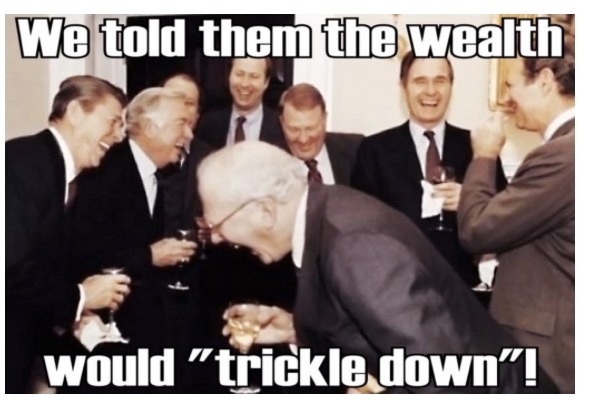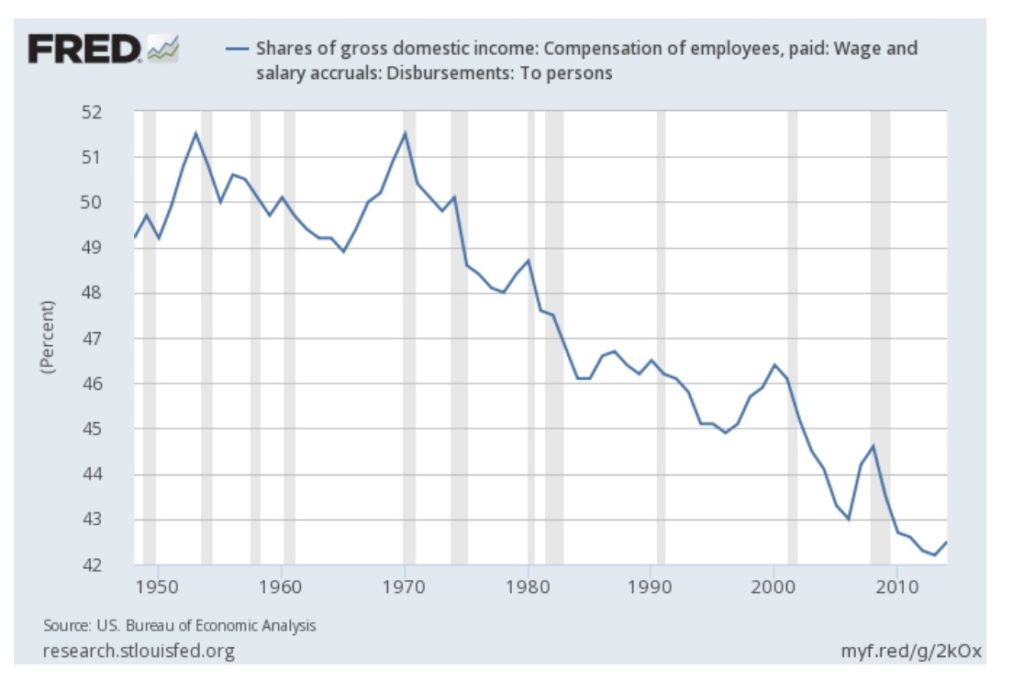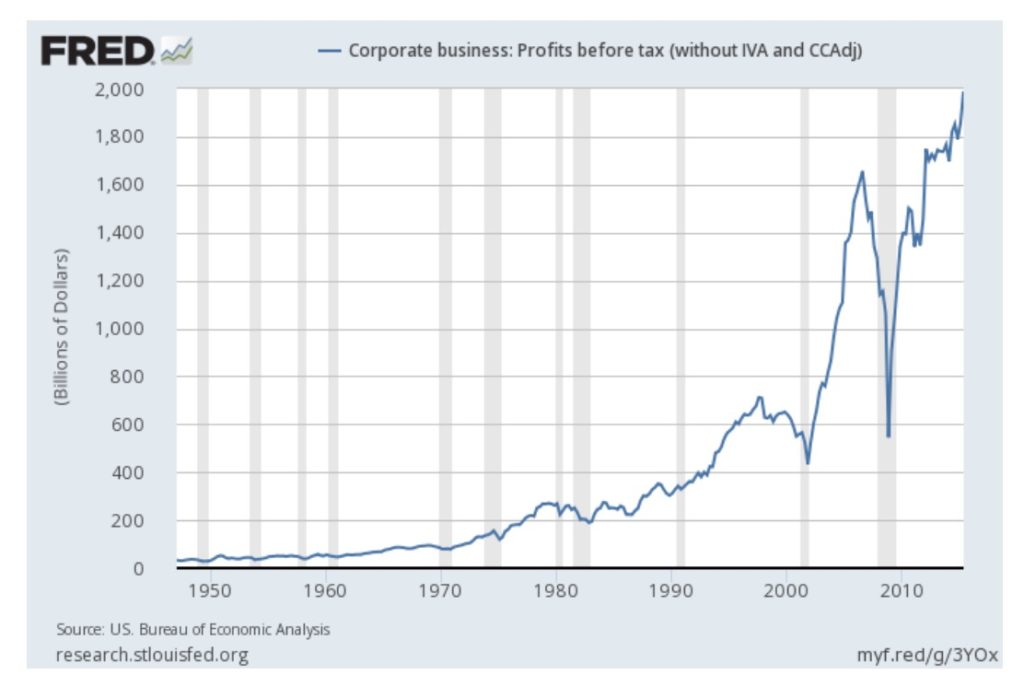
America used to be the land of opportunity and optimism. Now opportunity is seen as the preserve of the elite: two-thirds of Americans believe the economy is rigged in favour of vested interests. And optimism has turned to anger. Voters’ fury fuels the insurgencies of Donald Trump and Bernie Sanders and weakens insiders like Hillary Clinton.
The campaigns have found plenty of things to blame, from free-trade deals to the recklessness of Wall Street. But one problem with American capitalism has been overlooked: a corrosive lack of competition. The naughty secret of American firms is that life at home is much easier: their returns on equity are 40% higher in the United States than they are abroad. Aggregate domestic profits are at near-record levels relative to GDP. America is meant to be a temple of free enterprise. It isn’t.
– From the recent Economist article: The Problem with Profits
In the 1970’s, Goldman Sachs CEO Gus Levy famously encouraged his employees to be “long-term greedy.” In order to understand how far we have fallen as an economy and culture, it’s important to understand the meaning of the phrase and reflect upon it.
“Long-term greedy” implies two very important principles that define a well functioning and ethical free market economy. First, is the unrepentant belief that earning a good profit and striving for financial success is a reasonable and admirable goal for both individuals and corporations. Second, is the understanding that such financial success should be earned, not stolen. If one’s focus is the long-term, the implication is that you’re committing yourself to building something real, and that the marketplace will ultimately reward you handsomely for your product or service.
Throughout my childhood, and much of my adult life, I naively assumed this was the way the U.S. economy functioned. This was partly a result of propaganda, and partly a result of it still being somewhat true. What’s become abundantly clear; however, is that from my birth in 1978 to the present day, the U.S. economy has been, gradually at first, and then rapidly transformed into a rigged, oligarch-dominated, crony Banana Republic system.
Goldman Sachs and other TBTF banks gave up on the “long-term greedy” philosophy long ago. In fact, it was Wall Street’s maniacal obsession with short-term greed which led to a systemic culture of fraud in which being even remotely ethical meant sacrificing tens of millions in bonuses and promotions. While a cycle of such greed and criminal behavior is inevitable within any economic system where enormous profits are available, what is not inevitable is how Obama’s Justice Department responded to the criminality.
By appointing Covington and Burling attorney Eric Holder to head up the DOJ, Obama was building a moat around the TBTF banks to ensure they would never be brought to justice. As I’ve highlighted previously, many of the largest Wall Street banks are clients of Covington and Burling, and acute observers doubted Holder would prosecute these firms since he was likely to spin right back through the revolving door after shielding the mega-banks from prosecution. This is in fact exactly what he did.
Recall from last year’s post, Cronyism Pays – Eric “Too Big to Jail” Holder Triumphantly Returns to His Prior Corporate Law Firm Job:
After failing to criminally prosecute any of the financial firms responsible for the market collapse in 2008, former Attorney General Eric Holder is returning to Covington & Burling, a corporate law firm known for serving Wall Street clients.
The move completes one of the more troubling trips through the revolving door for a cabinet secretary. Holder worked at Covington from 2001 right up to being sworn in as attorney general in Feburary 2009. And Covington literally kept an office empty for him, awaiting his return.
The Covington & Burling client list has included four of the largest banks, including Bank of America, Citigroup, JPMorgan Chase and Wells Fargo.
Read that over and over until you get it. This is the sort of crap that happens in Banana Republics. America is a Banana Republic.
Although people are finally starting to figure this out (see Trump and Sanders), the elite, status quo, establishment, whatever you want to call them, could never have pulled this off without the unfathomable ignorance of the American public. As someone who was brainwashed for most of his life, I am sympathetic to this dilemma and I try not to be judgmental about it. It’s precisely why I have dedicated my life at this stage to informing people about what’s going on. There’s absolutely no doubt in my mind that we can stop this grotesque merger of crony corporate interests and government if we have the information and the will.
One of the biggest myths that the public needs to overcome is this false meme that a rising stock market signals good times ahead. This tool has been used to keep financially successful non-oligarchs from challenging the corrupt status quo. I explained this in detail back in 2013 in the post The Stock Market: Food Stamps for the 1%:
More than any other group, the 1% has been convinced that the stock market represents some sort of leading indicator of wealth and prosperity. Nothing could be further from the truth. Sure, the stock market can function as such an indicator. It is such an indicator when the rising stock market reflects a dynamic, capitalist economy where new industries and companies are rising to the top and improving standards of living for the populace. It represents the opposite indicator when it merely reflects the ownership interests of the oligarchs in a crony-capitalist, fascist economy that is picking away at the dying carcass of what little economic freedom still remains. This is what a rising stock market actually represents today. When people look at it they should understand it is merely a measure of the oligarchs getting wealthier and more powerful and you becoming more of a debt slave. It represents their interests in multinational corporations with record profit margins because they refuse to pay their employees a living wage. A rising stock market today is actually a leading indicator of the destruction of the middle class, cultural destitution and a society in collapse.
Mesmerized by rising stocks, most of those Americans with the resources and time to push for change simply did nothing. This ambivalence allowed the theft to continue, and years later the grassroots is finally rising up and expressing their anger via Donald Trump and Bernie Sanders. To make matters worse, the same group of people who spent the last few years staring at their E-Trade accounts are the same clownish pundits scratching their heads asking; why are people so angry?
People are angry because the economy really is rigged, and it’s been rigged for quite some time. However, what has really pushed people over the edge is the realization that the economic riggers destroyed the economy via fraud and then got away with it. This has resulted in the institutionalization of crime and fraud as the leading driver of U.S. GDP growth since the riggers know they are above the law. This is why people are mad, and they should be a lot angrier than they are.
Yesterday, I was surprised to come across an interesting article at CNBC (something which rarely happens). It was titled, Hillary Clinton Cannot Win U.S. Election: Libertarian, and it zeroed in on a recent research report published by Saxo Bank’s chief economist, Steen Jakobsen.
Here’s what we learned:
In a recent research note, he said the ratio between employee compensation to gross domestic product in the U.S. is the lowest in history and corporate profits are at their highest-ever point. This, he believes, is a key reason why U.S. citizens now want anything but the traditional establishment.
If you’ve always wanted to see what serfdom looks like in a couple of charts, you’re in luck:


Before you get all bent out of shape, I want to make something clear. I am a believer in free markets and I don’t think “profit” is a dirty word. Based on my understanding of human nature and history, I think it’s perfectly reasonable to advocate for an economic system in which individuals are incentivized by the opportunity to become financially successful. This doesn’t mean a handful of oligarchs should be allowed to rig the system in order to parasitically rent-seek from the public with impunity while adding zero value.
The Economist covered this topic well in a recent article. Here are a few excerpts:
America used to be the land of opportunity and optimism. Now opportunity is seen as the preserve of the elite: two-thirds of Americans believe the economy is rigged in favour of vested interests. And optimism has turned to anger. Voters’ fury fuels the insurgencies of Donald Trump and Bernie Sanders and weakens insiders like Hillary Clinton.
The campaigns have found plenty of things to blame, from free-trade deals to the recklessness of Wall Street. But one problem with American capitalism has been overlooked: a corrosive lack of competition. The naughty secret of American firms is that life at home is much easier: their returns on equity are 40% higher in the United States than they are abroad. Aggregate domestic profits are at near-record levels relative to GDP. America is meant to be a temple of free enterprise. It isn’t.
High profits might be a sign of brilliant innovations or wise long-term investments, were it not for the fact that they are also suspiciously persistent. A very profitable American firm has an 80% chance of being that way ten years later. In the 1990s the odds were only about 50%. Some companies are capable of sustained excellence, but most would expect to see their profits competed away. Today, incumbents find it easier to make hay for longer (see Briefing).
If steep earnings are not luring in new entrants, that may mean that firms are abusing monopoly positions, or using lobbying to stifle competition. The game may indeed be rigged.
Unfortunately the signs are that incumbent firms are becoming more entrenched, not less. Microsoft is making double the profits it did when antitrust regulators targeted the software firm in 2000. Our analysis of census data suggests that two-thirds of the economy’s 900-odd industries have become more concentrated since 1997. A tenth of the economy is at the mercy of a handful of firms—from dog food and batteries to airlines, telecoms and credit cards. A $10 trillion wave of mergers since 2008 has raised levels of concentration further. American firms involved in such deals have promised to cut costs by $150 billion or more, which would add a tenth to overall profits. Few plan to pass the gains on to consumers.
Getting bigger is not the only way to squish competitors. As the mesh of regulation has got denser since the 2007-08 financial crisis, the task of navigating bureaucratic waters has become more central to firms’ success. Lobbying spending has risen by a third in the past decade, to $3 billion. A mastery of patent rules has become essential in health care and technology, America’s two most profitable industries. And new regulations do not just fence big banks in: they keep rivals out.
Most of the remedies dangled by politicians to solve America’s economic woes would make things worse. Higher taxes would deter investment. Jumps in minimum wages would discourage hiring. Protectionism would give yet more shelter to dominant firms. Better to unleash a wave of competition.
The first step is to take aim at cosseted incumbents. Modernizing the antitrust apparatus would help. Mergers that lead to high market share and too much pricing power still need to be policed. But firms can extract rents in many ways. Copyright and patent laws should be loosened to prevent incumbents milking old discoveries. Big tech platforms such as Google and Facebook need to be watched closely: they might not be rent-extracting monopolies yet, but investors value them as if they will be one day. The role of giant fund managers with crossholdings in rival firms needs careful examination, too.
A total embrace and propagation of the situation described above is Obama’s real legacy. As I noted previously:
Trying to determine Barack Obama’s most corrupt, crony appointee presents a virtually impossible task. Every single person he’s appointed to a position of power over the course of his unfathomably shady, violent and unconstitutional presidency, has been little more than a gatekeeper for powerful vested interests. Obama’s job was to talk like a marxist, but act like a robber baron. In this regard, his reign has been an unprecedented success.
So are you ready to stop being suckers and take back the country?
For related articles, see:
Where Does the Real Problem Reside? Two Charts Showing the 0.01% vs. the 1%
New Report from Princeton and Northwestern Proves It: The U.S. is an Oligarchy
Bernie Sanders Passionately Decries the American Oligarchy on the Senate Floor
Portrait of the American Oligarchy – The Very Troubling Income and Wealth Trends Since 1989
When Asked if the U.S. is a Capitalist Democracy or Oligarchy, Janet Yellen Can’t Answer…
In Liberty,
Michael Krieger
Donate bitcoins: 35DBUbbAQHTqbDaAc5mAaN6BqwA2AxuE7G
Follow me on Twitter.



Go Liberty Blitzkrieg! GO GO GO!
Today’s ideal is unregulated, trickledown Capitalism.
We had un-regulated, trickledown Capitalism in the UK in the 19th Century.
We know what it looks like.
1) Those at the top were very wealthy
2) Those lower down lived in grinding poverty, paid just enough to keep them alive to work with as little time off as possible.
3) Slavery
4) Child Labour
Immense wealth at the top with nothing trickling down, just like today.
This is what Capitalism maximized for profit looks like.
Labour costs are reduced to the absolute minimum to maximise profit.
(The majority got a larger slice of the pie through organised Labour movements.)
The beginnings of regulation to deal with the wealthy UK businessman seeking to maximise profit, the abolition of slavery and child labour.
Where regulation is lax today?
Apple factories with suicide nets in China.
The modern business person chases around the world to find the poorest nation with the laxest regulations so they can exploit these people in the same way they used to exploit the citizens of their own nations two hundred years ago.
Labour costs are reduced to the absolute minimum to maximise profit.
Capitalism in its natural state sucks everything up to the top.
Capitalism in its natural state doesn’t create much demand.
You’ve always got a way of connecting the dots into a good story. You’ve got a way with story structure and punctuating your key points.
Keep up the good work. I follow you on Twttr
I’m not American, but everybody feels the US’s pain.
Quit blaming Capitalism. The U.S. has not had a true capitalist system for at least 100 years. Crony Capitalism (the present system) is a second cousin to Socialism. The cronies pay government officials to do their bidding, and the government hacks are more than happy to get rich in the process. The cronies get government to stop competition and give them sweetheart deals at the expense of the taxpayer.
Might as well bring on the socialists and make the bunch at the top even richer and put everyone else on welfare. Like they said in the Soviet Union: “We pretend to work and they pretend to pay us”.
Time to start packing and making exit arrangements…
Ken: You are spot on. Crony Capitalism is a second cousin to socialism and to fascism. Multinational banks and monopoly industrial corporations create foundations and non governmental organizations with socialist-sounding ideals like envirionmentalism but which really advance the interests of the funders. The foundations attract employees who, for the most part, I guess, think that they really are doing something good. Disguised as local initiatives, the programs are dutifully reported in a favourable manner by radio, TV, newspapers, magazines and film-makers whose corporations are owned and controlled by the foundation funders. The funders also contribute to, and thus control, political parties and candidates. And what do you know? Once elected, the candidates sign into law policies that benefit the funding corporations. How can a smaller business compete with that? The law and rules and regulations and licenses can be afforded only by the mega businesses. That’s why there is no competition.
I stopped reading The Economist years ago.
I cringe when I read the word “competition.” As a manufacturer I frankly have trouble with regulations, licensing, etc. so rarely that it seems like the largest straw man ever created by the masters of distraction. In other words, Ken and Moira, I have no idea what you’re talking about and I seriously question whether you do.
However, as I said, that word “compete” turns me blood red when speaking of my company vs. the statist-capitalist cheaters that our leaders and corporate oligarchs love so much. There is no regulation in the world stopping me from being better at what we do than one of my competitors in another state. Nor is it stopping me from being better than my counterparts in Shenzen. That 40% head start they have though? The traitors in the boardrooms and DC who can’t even point in the general direction of main street who made all this possible? Yeah, that is real.
Can anyone provide a link to those charts in Fred?
That is proof that Obongo is a charlatan and a corrupt muppet of the .01%.